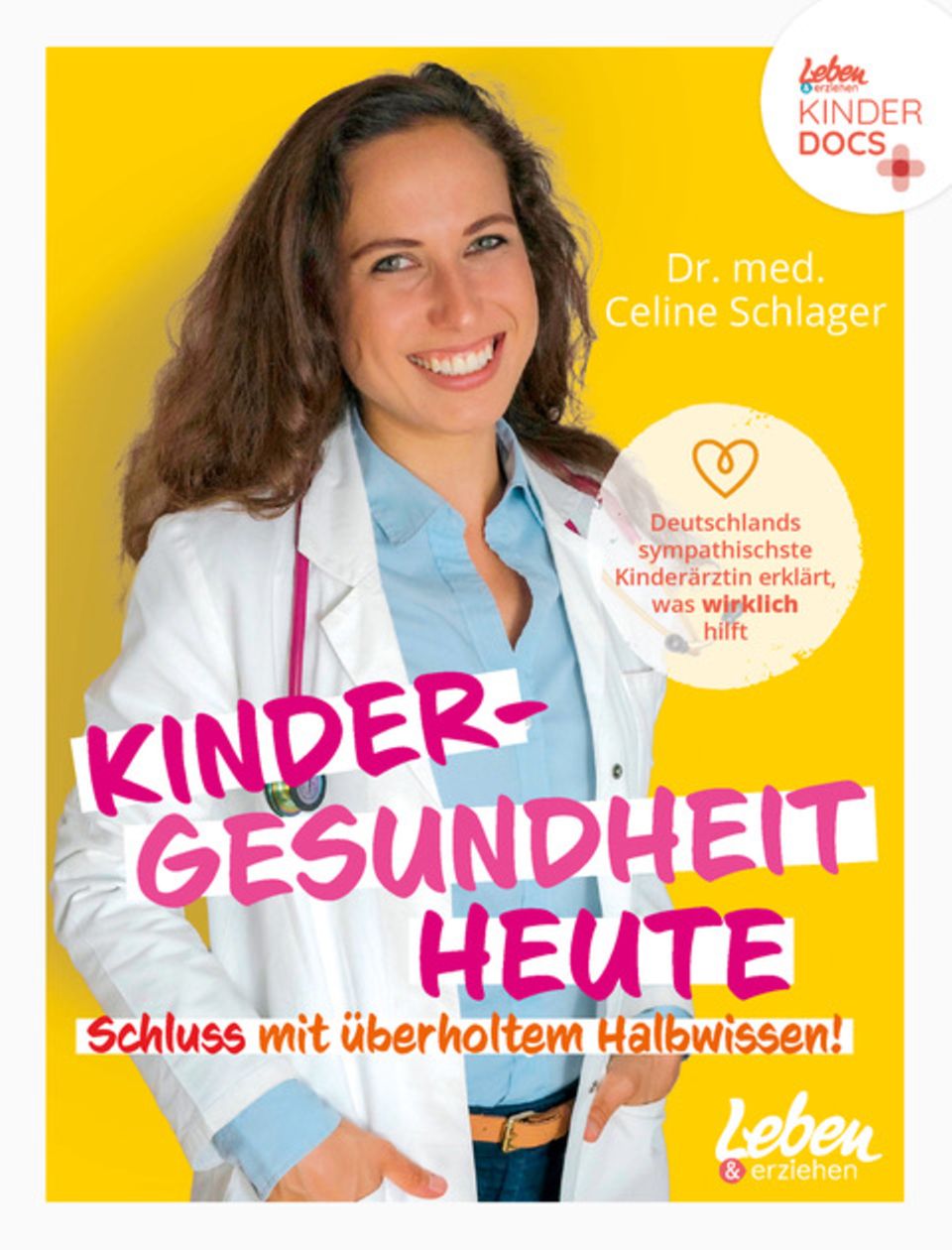A mother with a baby receives one thing above all: unsolicited advice on how she can do everything better. These wisdoms have a long tradition, but they are rarely true.
There are probably very few parents who are not given well-meaning tips after the birth of a child (especially the first one!) – without ever having asked for it. Everyone has heard or read something that could help – if the child doesn’t drink, if it has a fever, doesn’t sleep or if the mother doesn’t have enough milk. The recommendations about what is best for the child change every few years. For example with breastfeeding: In the 60s it was better to breastfeed for six weeks, in the 70s it was better not to breastfeed at all, in the 90s for half a year – or until the child was able to articulate the wish that it no longer wanted to be breastfed. (Now that’s just a tiny bit exaggerated!)
Pediatrician Celine Schlager gets to the bottom of the supposed wisdom surrounding the topics of illness, child development, nutrition, sleep, clothing and safety. We have picked out a few of the legends that have persisted for ages and summarized the doctor’s explanations.
A glass of sparkling wine promotes milk production
Alcohol has an impact on maternal hormones, so alcohol intake leads to a delay in the milk ejection reflex and a reduction in breast milk production. When consuming moderate amounts of alcohol (around 100ml of sparkling wine), this effect is only expected to a limited extent, and it only lasts as long as there is still alcohol in the mother’s bloodstream. It is also important to know that the amount of alcohol in the mother’s blood is almost the same as that in breast milk.
Exercising makes milk sour
Sometimes you hear that it is better not to do any exercise while breastfeeding because the lactic acid produced would make the breast milk sour and no longer taste good to the baby.
Moderate physical activity (a brisk walk) does not increase the lactic acid level in breast milk. Lactate, i.e. lactic acid, is only produced during very intensive exercise in the anaerobic area, and this also passes from the mother’s blood into the breast milk. This lactic acid does not cause any harm to the baby, but can change the taste of breast milk: from sweet to slightly sour to bitter. As a rule, however, the infant still accepts it. Some babies reject breast milk because of the change in taste, but this is only the case for a short time.
Fennel tea helps with stomach pain
The baby gets everything it needs in the first six months of life through breast milk or infant formula. Therefore, no (fennel) tea should be given before the intestines have reached maturity. Baby food should also not be mixed with fennel tea. The baby can only be offered tea once he or she has been given complementary foods.
Giving your baby evening food will help him sleep better at night
Industrially produced evening porridges promise with advertising claims such as “nicely filling before going to bed” that they have a positive effect on babies’ sleeping habits. The fact is: they fill the little tummy so much that the baby falls asleep from exhaustion. However, there is often no restful sleep for the rest of the night because the body is intensively busy with digestive work.
Dr. med. Celine Schlager works as a doctor in a children’s clinic and is a mother herself. That’s why she knows exactly what worries and fears parents and other family members have when it comes to their offspring. At Instagram She has built a large community with more than 60,000 followers. In her courses and consultations she tries to give answers and allay omnipresent fears.
© Junior Media
Alcohol boils away
When cooking with alcohol, it is often assumed that it evaporates. However, this depends heavily on the type and amount of alcohol and the method of preparation and how long a dish is cooked for.
In short: It is not recommended to cook with alcohol if pregnant women and children are eating with you. Dark chocolate, vanilla and cinnamon can replace red wine in some dishes, while grape or apple juice can add a fruity note.
It is unhealthy to feed children a vegetarian/vegan diet
Studies show that children who eat a predominantly plant-based diet are less likely to be overweight. It is often the case that parents who feed their child a predominantly plant-based diet deal with nutrients much more intensively and therefore cook fresh food more often.
Vegetarian and vegan children eat more fruit and vegetables, nuts, legumes and fiber. Also less sweets and ready meals. However, the potentially critical nutrients must be kept in mind: the iron supply was too low in some children on a plant-based diet. Vitamin B12 must be substituted with a vegan diet.
The child eats too little
Some of us hear this sentence all the time and relate it to ourselves and feel guilty. Here’s the thing: Depending on the age of the child, the amount of different foods they eat varies. Fluctuations in the amount of food children eat per day are also completely normal and do not need to worry you.
In addition to age, other factors also influence how much a child eats:
Gender: Boys often eat more than girls.
Movement: Children who are active eat more than quieter children.
Anatomy: Smaller children with a more delicate build eat less than larger children with a more compact build.
positive/negative stress – Being excited or in a conflict situation can cause children to eat more or less than usual.
Distractions – Screen media should be turned off during meals. Toys and books do not belong near the table. Otherwise, children do not really perceive what and how much they eat.
By the way, the size of the child’s palm is a good indication of a portion size.
Prevention for children
Everything parents should know about U-examinations
The baby should sleep on their side, this is safest
This recommendation was based on the assumption that this would prevent children from choking on their vomit. However, the recommendations for minimizing the risk of sudden infant death syndrome are now very clear: the supine position is recommended as the baby’s sleeping position. When lying on its side, there is a risk that the baby will accidentally roll over onto its stomach. In most cases, however, they are not yet able to turn back independently or hold their head for a long time. This can cause the baby’s head to sink into the mattress and no longer be able to breathe. Death by suffocation can then occur.
The child wakes up at night because he is hungry
Studies have shown that the absolute need for nighttime feeding is only necessary for most children until they are six months old. After that, the majority of children’s energy intake can be covered by their daily requirements.
Waking up at night is usually an orientation reaction. The child wants to be sure that the situation is unchanged. If the child has this security when waking up, the waking phases are usually very short and quickly transition into further sleep.
Cola and pretzel sticks help with the gastrointestinal
Many people swear by it. And it’s certainly the only medicine that makes children’s eyes light up: Cola with pretzel sticks for a gastrointestinal infection.
In principle, the matter seems logical: Cola replaces the excreted fluid in the body and quickly supplies the weakened body with energy through carbohydrates, primarily sugar. And the pretzel sticks supply the “salt”, primarily sodium, that the body loses through diarrhea.
This is actually true so far. Unfortunately, when you have diarrhea, the body lacks potassium in particular, and the best pretzel stick in the world doesn’t have that to offer. And there is even a big problem with the combination: the high sugar content of Cola. It has been found that the sugar content in cola is too high and its electrolyte content is too low to replace fluids when dehydrated. By the way, apple juice also contains too much sugar. These drinks are therefore not suitable as a fluid replacement. Furthermore, they can actually make the symptoms worse. Although sugar is necessary for the absorption of salts in the intestines, too much of it can trigger further diarrhea. Sugar binds fluid in the intestines. This means that the stool becomes even thinner.
Dirt cleanses the stomach
This saying has a very calming effect on parents; especially if a large load of “dirt” ends up in the baby’s mouth while digging in the sandbox. Infants and toddlers particularly enjoy exploring their world with their mouths. This is completely normal and also important for child development. Especially in the first two years of the oral phase, the sense of touch in the mouth region is very well developed (better than children’s other senses).
As long as the amount of dirt ingested remains small, this is usually not harmful. Children usually don’t get sick from “eating” some dirt.
However, too much dirt can also make you sick. When examining sandboxes in Italy, researchers discovered the intestinal bacterium Clostridioides difficile, which can cause diarrhea, in 21 of 40 samples. Of course, the amount always plays a role before dirt makes you sick.
E-cigarettes are harmless (for children)
E-cigarettes are becoming more and more popular. Many smoking parents wonder whether e-cigarettes/vaporizers might be a good, healthier alternative to “normal” cigarettes.
In short, it can be said: E-cigarettes are not a bit safer or less harmful – neither for children and thus passive smokers nor, of course, for the smokers themselves.
This article contains so-called affiliate links. Further information are available here.



